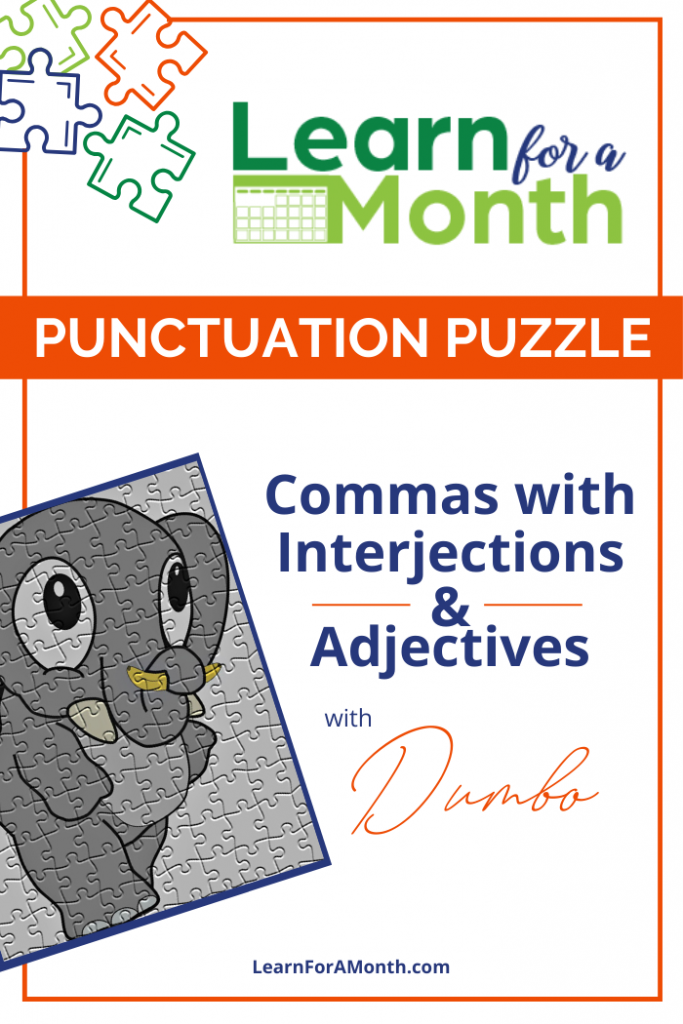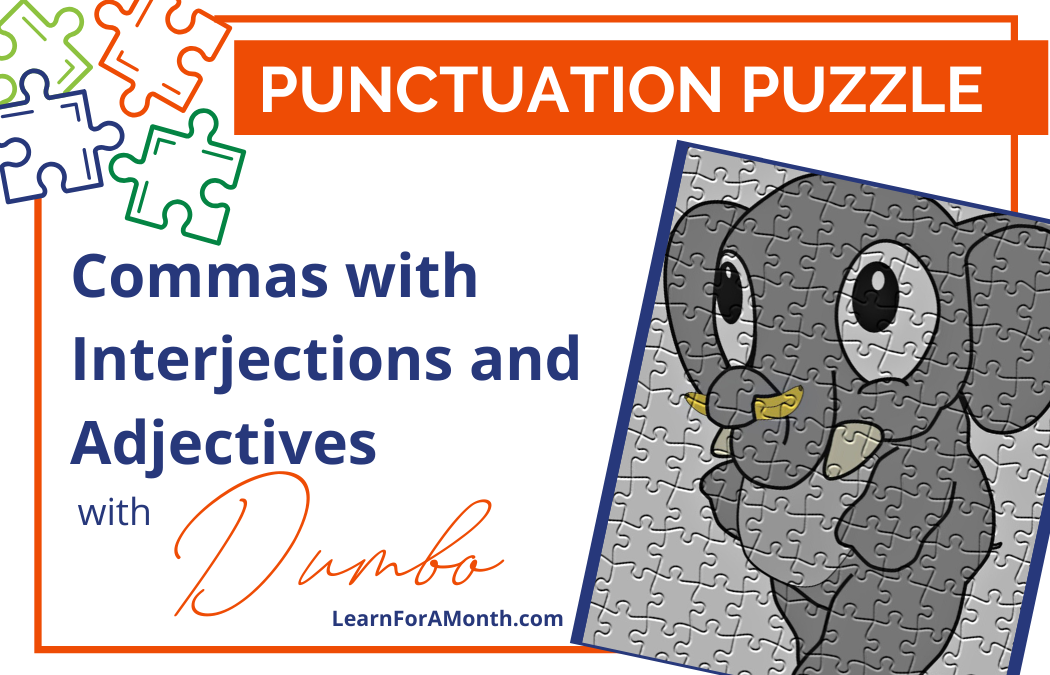Today’s Punctuation Puzzle brings to light an important comma rule that is not readily known. Commas are super subjective and thus challenging to write with. So whenever we can have a fairly fool-proof trick (or tricks in this week’s puzzle!) up our sleeve to make the comma insertion easier, we want to do it. (This is especially true in teaching English to our students—let’s make every trick, tip, mnemonic, song, rhyme, jingle, rap, and check sentence that we possibly can for our wonderful students! (See more of these in the Think Fast Grammar Quiz downloadable product available at Character Ink Store and in the Members Area of this blog!)

Yes tiny clumsy Dumbo was flying!
The answer?
Yes! Tiny, clumsy Dumbo was flying!
A. Interjections
Let’s start at the beginning of the sentence and work our way through it. As we begin, we realize that the first word, yes, is actually part of a special group of words known as interjections. So, what are interjections?
1. Interjections are emotional words that must be separated by commas or exclamation points from the rest of the sentence.
2. Six common interjections are my, no, oh, well, wow, and yes. We can easily remember them using the rhyme,
“My, Well, Oh,
Wow, Yes, No”.
3. What does it look like for interjections to be separated from the rest of the sentence? Let’s observe a few examples:
Oh! That must have felt terrible!
No, he would never be a famous circus elephant.
My, how flying thrilled him!
4. There are three important items to note from these examples
a. First, the reason we have to place a comma after an interjection is that there is a pause. It’s easy to use commas if you read what you write aloud and place a comma wherever you hear a pause.
b. Second, you can use an exclamation point instead of a comma wherever you feel it is necessary to add even more emotion to an interjection. It’s totally up to you!
c. Third, when you use an exclamation point after an interjection (in fact, whenever you use an exclamation point), you must capitalize the next word. We can see that in our first example—Oh! That must have felt terrible!
5. Since yes is an interjection, we must insert a comma or an exclamation point into our sentence. We could use either, but aren’t you excited that Dumbo can fly? I am! So, let’s use an exclamation point.
Now our sentence reads, “Yes! tiny clumsy Dumbo was flying!” However, we are missing something. Yes! We need to capitalize tiny. After we do that, we have this sentence: “Yes! Tiny clumsy Dumbo was flying!” However, an error still remains.
B. Commas with Adjectives
The next two words after “Yes!” are tiny and clumsy. Both of these words are adjectives that describe the noun Dumbo.
1. If there is just one adjective, we never need to worry about using a comma. However, multiple adjectives require slightly more thought.
2. There are two rules of thumb about when to use commas with adjectives.
a. Rule of Thumb #1 – If the adjectives make sense in reverse order, a comma is required. Let’s check out an example:
The huge, laughing crowd watched Dumbo.
The laughing, huge crowd watched Dumbo.
Either way they are placed, the adjectives describing the crowd make sense. Therefore, a comma needs to be inserted between them.
b. Rule of Thumb #2 – If the word and instead of a comma is inserted between the adjectives, and the adjectives still make sense, the comma is necessary.
The huge, laughing crowd watched Dumbo
The huge and laughing crowd watched Dumbo
The adjectives still make sense, so the comma here is necessary
3. Now let’s apply both these tests to our adjectives
a. Rule of Thumb #1 Test – If the adjectives make sense in reverse order, a comma is required.
Yes! Tiny clumsy Dumbo was flying!
Yes! Clumsy tiny Dumbo was flying!
Both wordings make sense, so we could just place the comma in it at this point. But let’s double check and try the second test.
b. Rule of Thumb #2 Test – If the word and instead of a comma is inserted between the adjectives, and the adjectives still make sense, the comma is necessary.
Yes! Tiny, clumsy Dumbo was flying!
Yes! Tiny and clumsy Dumbo was flying!
4. Inserting those changes we get our answer:
Yes! Tiny, clumsy Dumbo was flying!
Today’s Punctuation Puzzle sentence comes from a student writing assignment found in the Dumbo Twice-Told Tale downloadable product coming this fall! This Punctuation Puzzle was written by Zac Kieser and Donna Reish.
Love and hope,

P.S. What usage areas would you like to see for our Punctuation Puzzles? We can put a lesson together just especially for you! 🙂


Trackbacks/Pingbacks